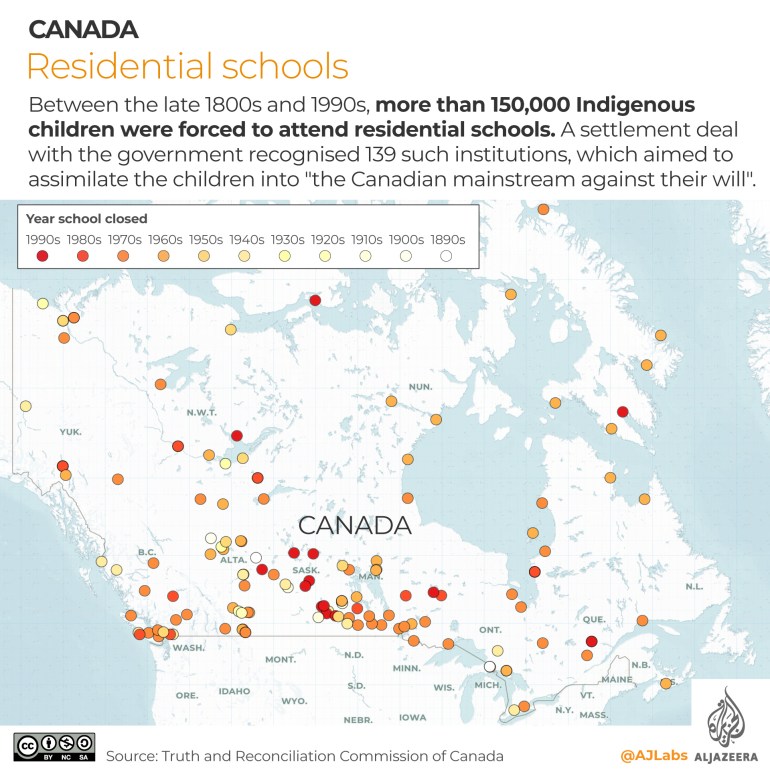Canada pledges millions to search for residential school graves
Hundreds of unmarked graves have been discovered at institutions Indigenous children were forced to attend for decades.

Warning: The story below contains details of residential schools that may be upsetting. Canada’s Indian Residential School Survivors and Family Crisis Line is available 24 hours a day at 1-866-925-4419.
Canada has promised tens of millions of dollars to help Indigenous communities in their search for unmarked graves linked to the government’s decades-long residential school system, which a commission of inquiry said in 2015 amounted to “cultural genocide”.
Keep reading
list of 4 itemsWill Canada face criminal charges for residential school abuses?
More unmarked residential school graves discovered in Canada
Canada: Protesters demand investigation into residential schools
Hundreds of unmarked graves have been discovered since late May on the grounds of residential schools across Canada.
Between the late 1800s and 1990s, more than 150,000 First Nation, Inuit and Metis children were forced to attend the institutions, which aimed to forcibly assimilate them and destroy their cultures. Thousands of children are believed to have died there.
In a news conference on Tuesday, Crown-Indigenous Relations Minister Carolyn Bennett said the government would provide an additional $66.2m ($83 million Canadian dollars) to help communities search for unmarked graves.
“As a country, we know the truth. Once you know the truth, you cannot unknow it. First Nations, Inuit and Metis communities have lived with the trauma caused by residential schools for generations,” Bennett said. “So today, we are announcing an additional $83 million in funding … to support more Indigenous communities in this extremely difficult and necessary work.”

The announcement comes as Canadian Prime Minister Justin Trudeau is widely expected to trigger a snap election in the coming months amid countrywide calls for his government to do more to address the intergenerational trauma caused by residential schools.
Since hundreds of graves were first discovered at the Kamloops Indian Residential School in the western province of British Columbia in late May, Indigenous community leaders and residential school survivors and their families have been plunged into renewed trauma.
They have demanded Ottawa support Indigenous-led efforts to find more unmarked graves and pressure the Catholic Church – which ran most of the institutions – to release its records, apologise and pay reparations.
A national commission of inquiry into residential schools, known as the Truth and Reconciliation Commission, in 2015 found that the policy was an act of “cultural genocide”. It also issued 94 calls to action to address the harms caused by the system.
Canada’s 2019 budget provided $28m ($33.8 million Canadian dollars) across three years to support the recommendations on deaths at the schools specifically and Trudeau and his ministers have reiterated that they remain committed to supporting First Nation communities in their efforts.
But Indigenous advocates have said too little has been done, pointing to the fact that the government has implemented very few of the TRC’s recommendations to date.
Late last month, opposition New Democratic Party (NDP) parliament members led a march in the capital, Ottawa to demand an independent investigation into residential schools.
“We need to come together and tell the federal institution and Justin Trudeau that enough is enough: Indigenous Peoples need truth and justice,” Mumilaaq Qaqqaq, who represents the northern territory of Nunavut, wrote in a social media post before the event.
“That means a special prosecutor and a fully-funded independent investigation, with international observers present, into Canada’s crimes against Indigenous peoples.”
Indigenous community leaders also have called on police to lay criminal charges against the Canadian government, churches and individual perpetrators of crimes committed in the institutions. Others have encouraged the International Criminal Court (ICC) to open an investigation.
In its announcement on Tuesday, the government pledged millions of dollars to bolster mental health support for survivors; help communities manage residential school buildings, and build a national monument in Ottawa to honour survivors and all those who were taken to the institutions, among other measures.
Ottawa also said it would appoint a special interlocutor to work with Indigenous people, communities, and provincial and territorial governments “to identify needed measures and make recommendations relating to federal laws, regulations, policies and practices surrounding unmarked and undocumented graves and burial sites at residential schools”.

Also on Tuesday, the Squamish, Musqueam and Tsleil-Waututh Nations on Canada’s west coast announced an Indigenous-led investigation “to find answers about the children who attended the former St. Paul’s Indian Residential School but never made it home”.
In a statement, the communities said more than 2,000 Indigenous children from the three nations, as well as from other Indigenous communities, attended St Paul’s.
The North Vancouver institution was run by the Catholic Church and operated from 1899 to 1959, according to the Indian Residential School History & Dialogue Centre.
“It’s important to note that our People’s experiences with St. Paul’s Indian Residential School are well known and healing is needed to move forward,” said Khelsilem, spokesperson for the Squamish Nation. “This work is being done to respect and address both known and unknown knowledge, and is a critical part of reconciliation.”